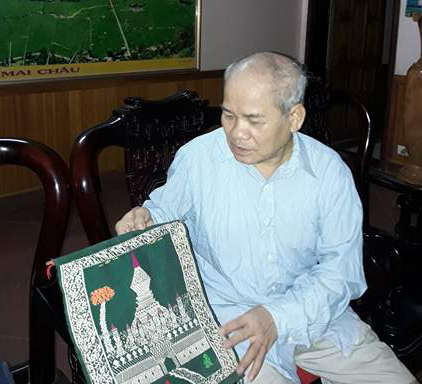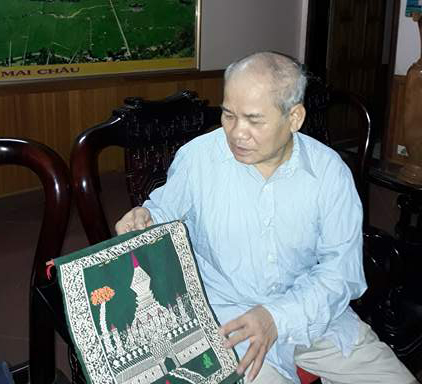
(HBO) – These days, whenever watching TV programmes featuring activities to celebrate the Vietnam-Laos Friendship and Solidarity Year 2017, Ha Van Tuan, former Chairman of the People’s Committee of Mai Chau district, Hoa Binh province, is always filled with sentiments that is difficult to describe with words. Only those who visited the nation of Champa flower can understand these feelings when hearing the names of destinations and people of the country.
Meeting Tuan in a morning in July in Mai Chau town,
Mai Chau district, and listening to his stories, we know that his days in
Laos have
become sacred and priceless memories.

A brocade with That Luang tower embroidery - the
symbol of
Laoshas been preserved by Ha Van Tuan.
In late 1983, Tuan was surprised with delight to be
sent from Mai Chau Agriculture Office to the provincial Committee for
Economic-Cultural Cooperation with
Laos. He was dispatched to Luang
Phrabang to help the province build a pilot agricultural cooperative and
develop high productivity rice varieties. This was part of the economic and
cultural affilication programmes of the two twinned provinces of former Ha Son
Binh province and Luang Phrabang of
Laos.
He was a little nervous when arriving in the country
with strange geographic names, such as the Tay Trang border gate, Nam Bac, Nam
U, and Mekong River, but he became confident with his fluent Thai language. His
team included some leaders of the district, officials of Van Mai commune’s
agricultural cooperative as well as construction and architecture companies.
At that time,
Vietnamwas on a subsidy period with many difficulties, but the living conditions in
Laos were even
more difficult. Locals in the country faced many problems, especially low literacy
and the spreading of malaria, along with poor infrastructure system and tough
roads.
Sharing difficulties facing locals, Tuan and other
members of the working group were resolved to make all-out efforts in order to
help them practically. The first job was to understand local geography as well
as cultivation and production conditions in the locality. Thanks to support of
Lao friends, the working group had many chances to visit hamlets and districts
in Luang Prabang to learn about locals’ farming methods. They, therefore,
proposed using only organic fertilizers, not using or using a small amount of
chemical fertilizers, aiming to generate productivity equal or higher than the
traditional farming methods which used a lot of chemical fertilizers. The proposals
were agreed by their superiors. They helped agricultural officials in Luang
Prabang conduct experiments on rice varieties in order to select suitable
varieties to plant in the locality. With the passion, Tuan rode a bicycle to
the Pak-Suong centre of rice varieties to work together with local agricultural
officials to create new rice varieties. His efforts paid off as productivity
was improved and local agricultural officials and farmers got used to the
advanced farming methods. Tuan collected a lot of memories after the three-year
working trip, from travelling hundreds of km to the experimental centre to
conversations with farmers in Na Sang, Khoi and Pong Van hamlets in Sang Kha
Loc commune to exchange farming experience, or with Lao friends such as Bun
Thin, Hum Phenh, Lot-vi Say, Phu Ma and Kham Keo.
After the re-establishment of Hoa Binh province, Tuan had a chance to
return
Vientianeand Luang Prabang. He was delighted to see changes in UNESCO-recognised Luang
Prabang city and meet with his Lao friends. The city has maintained its
hospitality and lifestyle in the 1980s, which has made it become more beautiful
and memorable. Tuan and other officials of former Ha Son Binh province
contributed to developing the twining relationship between Ha Son Binh and
Luang Prabang provinces as well as between
Vietnamand
Laosin general.
Bui Huy
The emulation movement "Hoa Binh joining hands to build new-style rural areas” has been widely spreading, becoming a driving force that motivates the localities to renew rural landscapes and improve the material and spiritual lives of the residents. In this movement, the people play a central role-both as the main implementers and direct beneficiaries of its outcomes.
In response to the global digital revolution, Hoa Binh Newspaper is transforming itself into a modern and multi-platform media hub, blending cutting-edge technology with a restructured newsroom and a new generation of tech-savvy journalists.
Hoa Binh province’s Association of the Elderly recently held a conference to review the project on expanding the inter-generation self-help club model until 2025.
In a move to implement Resolution No. 57-NQ/TW, issued on December 22, 2024 by the Politburo, which targets breakthroughs in science-technology development, innovation, and digital transformation, the Hoa Binh provincial Department of Health has issued a plan to roll out the "Digital Literacy for All” campaign within the local health sector.
An Nghia Commune (Lạc Sơn District) is one of the communes that achieved the tha standard of the national new rural area in 2018. Entering a new development phase, the commune is now trying to meet the criteria for the advanced new rural development. With the strong political will and the public consensus, the commune is gradually overcoming the challenges to reach this goal, aiming for the sustainable development.



